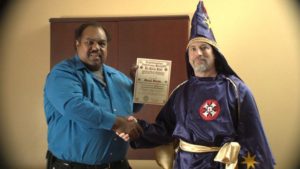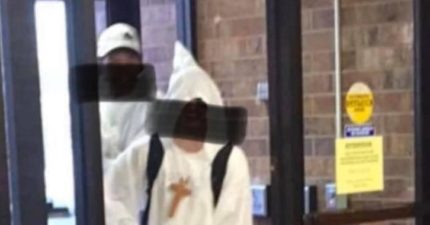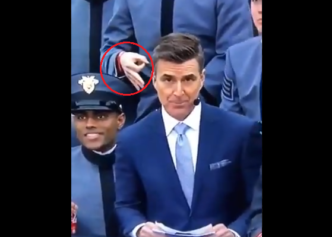
Daryl Davis shakes hand with Ku Klux Klan leader. Image courtesy of First Run Features.
A photo of a Black man gladly shaking hands with a Ku Klux Klan Grand Wizard is enough to raise a few eyebrows. Critics have called him crazy for trying to befriend members of the notorious hate group, but blues musician Daryl Davis remains undeterred in his quest to change the hearts and minds of white bigots.
According to the Los Angeles Times, Davis, a traveling blues musician who’s played with the likes of Little Richard and Jerry Lee Lewis, has spent the past few decades collecting over a dozen Klan robes from members who’ve disavowed their white supremacist views. Now, a documentary chronicling his idealistic journey is set to debut in Los Angeles on Friday, Dec. 9.
The film, “Accidental Courtesy” by director Matt Ornstein, follows Davis as he travels to Confederate memorials, churches and even Klansmen’s homes to try and inform white supremacists of the history of Blacks in America, while opening their eyes to the unnecessary hatred they’ve harbored toward African-Americans for so long.
His goal? To find ways of coming together as a nation, especially during this trying time of heightened racial tensions between Black and white Americans. For the musician, fostering tough conversations about race is a major part of fighting racism.
“How can you hate me when you don’t even know me?” Davis asks in the film. “Look at me and tell me to my face why you would lynch me.”
With frustrated Americans still reeling from the recent back-to-back shootings of unarmed Black men by police and the inflammatory nationalist rhetoric that propelled Donald Trump to the U.S. presidency, many could argue that this is one of the most divisive times in our nation’s history. Over 1,000 hate crimes and acts of intimidation have happened since the election, but Davis said this isn’t history repeating itself; rather, it’s history that never went away.
“I did not vote for Donald Trump and I do not support him, but I believe that Trump is the best thing to happen to this country in a long time,” Davis said in an interview. “He’s bringing out the country’s ugliness. There’s no turning a blind eye anymore.”
Naturally, critics of Davis’ idealistic outlook on repairing race relations has ruffled a few feathers, prompting push back from the Black community. One of the robe-collecting Black man’s critics is a well-known activist out of Baltimore named Kwame Rose, who marched through the city streets following the death of Freddie Gray.
“Infiltrating the Klan ain’t freeing your people,” says Rose during a sit-down with Davis in the film. “You’re uneducated about the reality of most of the people who look like you. … Stop wasting your time going to people’s houses who don’t love you, a house where they want to throw you under the basement. White supremacists can’t change.”
Even members of the NAACP have chewed him up and spit him out.
“[He said] ‘You know, we’ve worked hard to get 10 steps forward,'” Davis recalls. “‘Here you are sitting down with the enemy having dinner. You’re putting us 20 steps back.'”
So why the fascination with getting white supremacists to change their ways?
In a sit-down with The Atlantic last year, Davis chronicled his early childhood overseas, as well as his first brush with discrimination in the U.S. He recalled having cans, bottles and rocks thrown at him during a Massachusetts Boy Scouts march in 1968, as he was the only Black scout there. Years later, the head of the American Nazi Party came in as a speaker to his 10th-grade class, telling him, “We’re going to ship you back to Africa. And all you Jews out there are going back to Israel. If they don’t leave voluntarily, they will be exterminated in the coming race war.”
And that’s when his interest in everything race related was piqued.
In the years since his journey began, Davis has joined an all-white country band, attended KKK rallies and accepted a “certificate of friendship” from the Traditionalist American Knights of the KKK, The Los Angeles Times reported. He’s even the godfather of former Klan Imperial Wizard Roger Kelly’s granddaughter.
Kelly was one of the first to extend his hand and hand over his robe to Davis when he quit the Klan. Twelve other ex-Klansmen followed suit, according to The Atlantic. The blues musician said he hopes to one day showcase all of his collected Klan memorabilia in a “Museum of the Klan.”
Davis said he didn’t originally set out to “convert” white supremacists, only to foster discussion around race issues in order to put a dent in racism. He said some of them simply changed themselves after multiple conversations with him.
“The most important thing I learned is that when you are actively learning about someone else, you are passively teaching them about yourself,” Davis said. “So if you have an adversary with an opposing point of view, give that person a platform. Allow them to air that point of view, regardless of how extreme it may be.”


